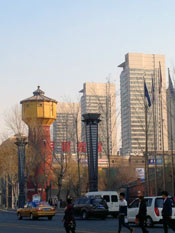 As has been observed about Russian and Japanese modernisms, Chinese modernism was initiated with a sense of lack: the contact with an Other civilization (e.g., that of the West) more capable of controlling reality, one more materially powerful. If revolution is a rupture with the past, the Chinese revolution constituted a rupture with a relationship to space that flowed through the subjective experience of poetry, and its replacement with an ongoing process of rationalization, mapping, understanding—one often initiated by colonizers, whether the Westerners in the treaty ports, or the Japanese in the North. In other words, a subject trained to interact with an environment on the basis of a tradition of poetry, painting, and landscape architecture, in which the self was holistically internalized into a larger built environment, was forced to confront an environment in the process of transformation: mountains became mines, forests became timber, and of course, humans became factory workers.[3]
As has been observed about Russian and Japanese modernisms, Chinese modernism was initiated with a sense of lack: the contact with an Other civilization (e.g., that of the West) more capable of controlling reality, one more materially powerful. If revolution is a rupture with the past, the Chinese revolution constituted a rupture with a relationship to space that flowed through the subjective experience of poetry, and its replacement with an ongoing process of rationalization, mapping, understanding—one often initiated by colonizers, whether the Westerners in the treaty ports, or the Japanese in the North. In other words, a subject trained to interact with an environment on the basis of a tradition of poetry, painting, and landscape architecture, in which the self was holistically internalized into a larger built environment, was forced to confront an environment in the process of transformation: mountains became mines, forests became timber, and of course, humans became factory workers.[3]
|
|
||||
|
Telos Press Publishing · PO Box 811 · Candor, NY 13743 · Phone: 212-228-6479 Privacy Policy · Data Protection Copyright © 2025 Telos Press Publishing · All Rights Reserved |
||||


